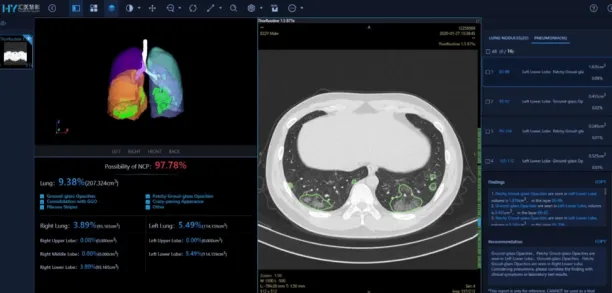Top companies in AI-powered medical imaging in 2024
Around 75% of all medical malpractice claims against radiologists are related to diagnostic errors. According to research, five factors that are responsible for radiology errors are:
- Heavy workload
- Visual fatigue
- Mental fatigue
- Inattentional blindness
- Lack of expertise
AI algorithms can be trained to analyze medical images and identify patterns and abnormalities that may be missed by human eyes. This not only saves time, but it also helps to improve the accuracy of diagnoses and treatment plans.
In this article, we’ll explore how AI can be used in medical imaging and top medical imaging companies.
How is AI used in medical imaging?
Aim of medical imaging is to capture abnormalities using image processing and machine learning techniques. Application areas can be divided into sub-branches such as the diagnosis of various diseases and medical operation planning. The top applications of AI-powered medical imaging are:
1. Revealing cardiovascular abnormalities
According to an article published by Frontiers in Cardiovascular Medicine Journal in 2019, the integration of AI into cardiac imaging will accelerate the process of the image analysis which is a repetitive task that can be automated, therefore healthcare professionals engaged in this work can focus on more important tasks.
2. Prediction of Alzheimer’s disease
The Radiologic Society of America suggests that advances in AI can lead to predicting Alzheimer’s disease years before it occurs by the identification of metabolic brain changes.
3. Cancer detection
In early 2020, the Google health team announced that they developed an AI-based imaging system that outperformed medical professionals in detecting breast cancer.
4. Treatment revaluation
This is mostly used for cancer patients undergoing treatment to check if the treatment is working effectively and diminishing the size of the tumor.
5. Surgical Planning
Medical imaging also allows for the segmentation of the image related to the surgical area so that the algorithm can do the planning for healthcare professionals automatically. Surgical planning with the help of medical imaging can saves time in surgeries.
Check our comprehensive article on the use of AI in radiology.
How mature are medical imaging applications?
AI medical imaging applications give great results in research projects and pilots like this one for breast cancer or pancreatic cancer. However, its use in the field is not common yet. This is because the FDA approval process can take years and the applications that were previously approved did not provide significant benefits. A computer-aided cancer detection software, approved by the FDA in 1998, was reported to cost more than $400M and did not show any significant improvement in a study.
However, the future of AI-powered medical imaging is bright and new advancements happen continuously. For instance, in November 2020, the Technical University of Munich has developed a machine learning model for detecting diabetes induced eye diseases as accurately as humans.
How was AI-powered medical imaging technologies used during the COVID-19 outbreak?
Overall, impact of AI solutions on COVID outbreak was limited but there are some examples where technology was demonstrated in a specific group of patients.
Medical imaging is one of the AI-powered solutions that was frequently mentioned with the COVID-19 pandemic. Due to the rapid increase in the number of patients, the analysis and interpretation of patients’ chest scan results became a problem. For example, a Chinese company, Huiying Medical claimed to have developed an AI-powered imaging diagnostic solution to detect the virus in the early stage with 96% accuracy.

Pneumonia is a serious complication of COVID-19 and results in patients requiring ventilator support. In a collaborative research by the University of California San Diego health department and AWS, a model was built to analyze chest images of patients at risk of pneumonia. The model was trained to identify patients infected with Covid-19 by using AI-powered medical imaging. The algorithm was trained on 22,000 notations by human radiologists. The algorithm performs color-coded maps that indicate the probability of pneumonia.
Leading medical imaging companies
AIMultiple prepared a sortable list of all AI-powered medical imaging companies. We focused on startups and left out market leaders even though they are also integrating AI technologies into their existing product lines.
- Butterfly Network: Butterfly aims to bring a different perspective on medical imaging with both hardware and software solutions. Butterfly IQ is a portable mobile device that uses ultrasound-on-chip technology which makes it the world’s first handheld entire body ultrasound framework. The device also claims to have the capability of detecting diseases in real-time while scanning. Dr. Jonathan Rothberg, chairman of Butterfly Network, is a recipient of National Medal of Technology and Innovation from the White House. Recently, Butterfly iQ3 announced FDA clearance.
- Arterys built the first tech product to visualize & quantify blood flow in the body using any MRI. Arterys also received the first FDA approval for clinical cloud-based deep learning in healthcare. Furthermore, Arterys, a pioneer in four-dimensional (4D) cloud-based imaging, has been awarded “Best New Radiology Vendor” and “Best New Software” in the 2016 Minnies Awards. Arterys has ranked as one of the World’s 50 Most Innovative Companies by FastCompany in 2019. Arterys’ Lung-AI platform helps to reduce missed detections by 42 to 70%.
- Gauss Surgical Inc. part of Stryker received CE (Conformité Européenne) Mark for its Triton System for iPad, the world’s first and only mobile platform for real-time monitoring of surgical blood loss.
- Sigtuple‘s innovative solutions aim to solve the problems caused by the chronic shortage of trained medical practitioners in India.
- Freenome raised 70.6M within only two years of its launch. Freenome works on detecting cancer by imaging blood cells.
- Enlitic uses deep learning techniques to analyze the data extracted from radiology images. A study suggests that radiologists can read cases 21% faster with the help of Enlitic.
- Caption Health provides guidance to healthcare professionals and inexperienced people to perform ultrasound examinations accurately and quickly. it also facilitates the work of healthcare professionals by providing automatic quality assessment and smart interpretation.
- Behold.ai uses artificial intelligence technologies to help radiologists diagnose radiology scans in a variety of cases. behold.ai reduces the workload of medical professionals by fastening the process of diagnosis.
- Viz.ai raised $50 M in late 2019 for detecting early signs of brain stroke. February 2020, vit.ai released a new generation synchronized care platform for those who are in the post-acute care period. The platform sends a notification to healthcare professionals when there is a sign of a serious situation.
- RetinAi‘s “Discovery Platform” helps to collect, organize and analyze health data from the eye in order to detect age-related macular degeneration (AMD), diabetic retinopathy (DR), and glaucoma, etc.
- Subtle Medical: Subtle Medicals’ software improves the quality of noisy medical images and provides better interpretation. It is especially helpful for patients who have difficulty holding still for long periods of time.
- BrainMiner is a UK based company and Brainminers’ software DIADEM provides an automated system for analyzing MR brain scans, to help the clinicians with an easily interpreted report.
- Lunit has developed AI solutions for precision diagnostics and therapeutics. The company aims to optimize diagnosis and treatment matches by searching for the right diagnosis at the right cost, and the right treatment for the right patients. In collaboration with Lunit and GE Healthcare launched an AI-powered chest X-ray analysis package designed to detect and highlight eight common conditions, such as tuberculosis and pneumonia, including those linked to COVID-19, using their algorithms.
If you have questions about AI-powered medical imaging, feel free to ask us:

Cem has been the principal analyst at AIMultiple since 2017. AIMultiple informs hundreds of thousands of businesses (as per similarWeb) including 60% of Fortune 500 every month.
Cem's work has been cited by leading global publications including Business Insider, Forbes, Washington Post, global firms like Deloitte, HPE, NGOs like World Economic Forum and supranational organizations like European Commission. You can see more reputable companies and media that referenced AIMultiple.
Throughout his career, Cem served as a tech consultant, tech buyer and tech entrepreneur. He advised businesses on their enterprise software, automation, cloud, AI / ML and other technology related decisions at McKinsey & Company and Altman Solon for more than a decade. He also published a McKinsey report on digitalization.
He led technology strategy and procurement of a telco while reporting to the CEO. He has also led commercial growth of deep tech company Hypatos that reached a 7 digit annual recurring revenue and a 9 digit valuation from 0 within 2 years. Cem's work in Hypatos was covered by leading technology publications like TechCrunch and Business Insider.
Cem regularly speaks at international technology conferences. He graduated from Bogazici University as a computer engineer and holds an MBA from Columbia Business School.
To stay up-to-date on B2B tech & accelerate your enterprise:
Follow onNext to Read
Medical Annotation: Best Practices & Use Cases in 2024
Healthcare Analytics: Importance & Market Landscape in 2024
Hello, we didn’t look specifically for error complaints. But Google “ai failures in healthcare” and around 6M results show up. So, AI in healthcare isn’t without its negatives.


Comments
Your email address will not be published. All fields are required.